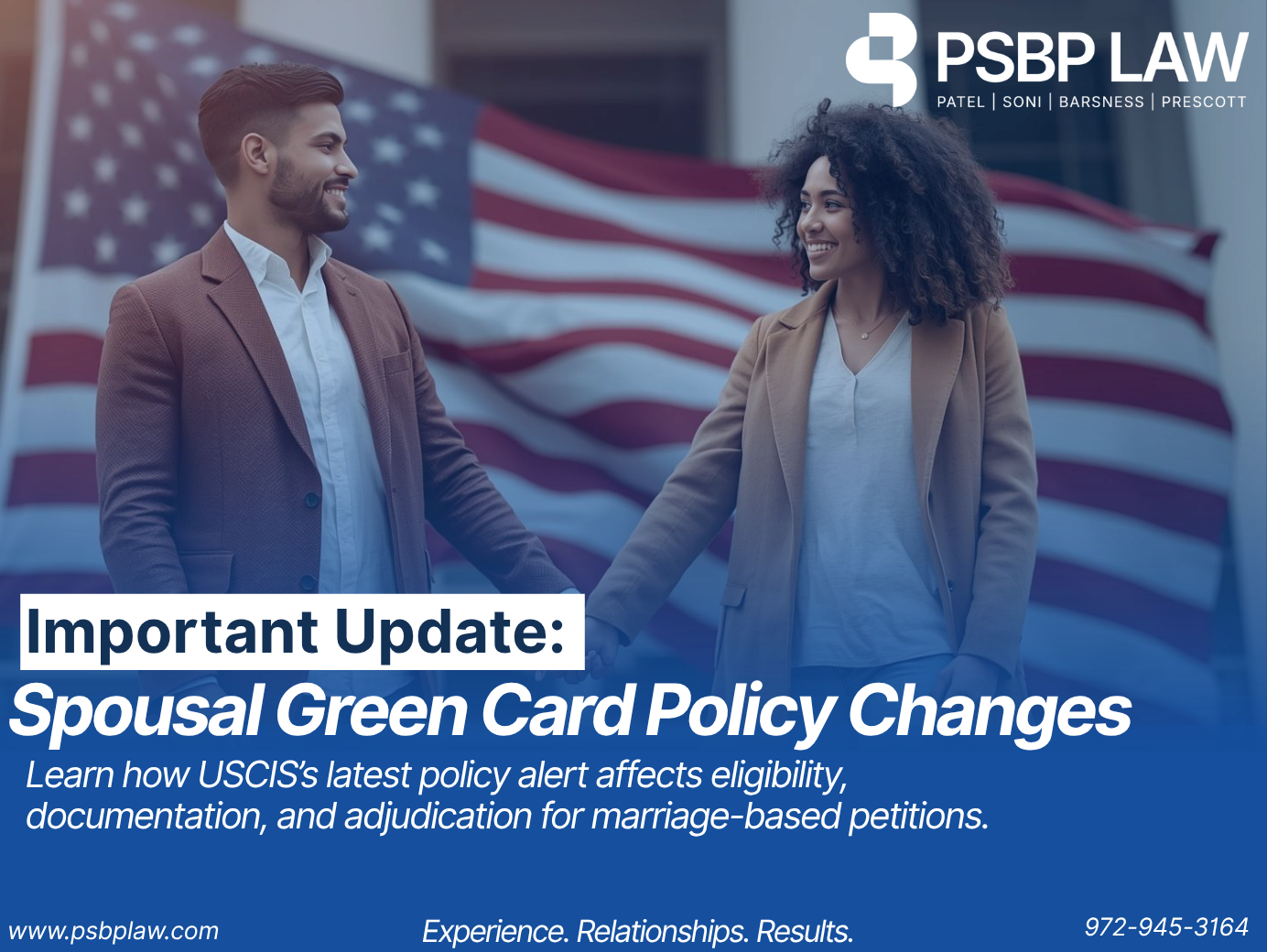On October 17, 2025, U.S. Citizenship and Immigration Services (USCIS) issued a policy alert revising the USCIS Policy Manual to provide updated guidance on qualifying spousal relationships for family-based Form I-130 immigrant visa petitions under the Immigration and Nationality Act (INA). The policy is effective immediately and applies to all petitions pending or filed on or after October 17, 2025.
This update clarifies which marriages qualify for immigration benefits and strengthens fraud prevention measures in marriage-based green card adjudications.
Key Updates in the USCIS Policy Manual
- Same-Sex Marriages
USCIS reaffirms its commitment to marriage equality, confirming that same-sex marriages are treated equally to opposite-sex marriages under immigration law.
- A same-sex marriage will be recognized if it is legally valid in the place of celebration, regardless of where the couple currently resides or whether their state recognizes such marriages.
- The policy aligns with the U.S. Supreme Court’s rulings, which affirm marriage equality under federal law.
- Definition of “Spouse” and Recognized Marriages
The policy update clearly defines which marriages are legally recognized for Form I-130 petitions. Only marriages that are legally valid where they were celebrated and not contrary to U.S. public policy qualify for immigration benefits.
USCIS now specifically addresses several types of marriages:
- Marriages Involving Minors: These may raise public policy concerns depending on the age of the individuals and the relevant state or foreign laws. USCIS emphasizes that officers must carefully evaluate whether such marriages are legally valid and free from coercion, taking into account state laws, age requirements, and consent standards.
- Proxy Marriages: Recognized only if the marriage was later consummated and is legally valid in the jurisdiction where it took place.
- Marriages Violating Public Policy: Marriages entered into under coercion or in violation of state criminal laws will not be recognized for immigration purposes.
- Virtual or Online Marriages
In light of modern technological developments, USCIS clarifies that virtual or online marriage ceremonies, such as those conducted via videoconference, must meet the same legal standards as in-person marriages.
- The place-of-celebration rule applies: the marriage must be valid under the laws of the jurisdiction where it was performed.
- If a state does not recognize virtual marriages, this does not affect validity as long as the marriage was lawfully celebrated in a jurisdiction that does.
- Similar to Proxy Marriages, the marriage must be consummated after the ceremony.

- Eligibility and Adjudication Guidance
The policy consolidates existing instructions for USCIS adjudicators regarding eligibility, required documentation, and interview procedures for spousal petitions.
- Adjudicators are reminded that they may require an interview if further verification is needed or if there are inconsistencies within the petition.
- USCIS will also conduct an interview in the following spousal cases:
- One or both spouses were under the age of 15 at the time of the marriage;
- One spouse was 16 or 17 and the other spouse was at least 10 years older at the time of the marriage;
- The petitioner previously filed a spousal petition for a different individual; or
- An adverse decision or withdrawal request was made on a prior spousal petition involving either the petitioner or alien spouse.
- Bona Fide Marriage Requirement
A core emphasis of the policy is the bona fide marriage requirement—the petitioner must demonstrate that the marriage was entered into in good faith and not solely to obtain an immigration benefit.
Evidence to establish bona fides may include:
- Joint financial accounts and shared assets
- Proof of cohabitation or shared residence
- Correspondence/communication between spouses
- Affidavits from friends or family confirming the relationship
USCIS will evaluate the totality of the circumstances and must determine that the marriage is bona fide before the petition can be approved.
- Statutory Bar for Fraudulent Marriages
The updated guidance reiterates that individuals who have attempted, conspired, or entered into a fraudulent marriage to evade U.S. immigration laws are permanently barred from receiving any immigration benefits based on marriage.
USCIS Officers are instructed to review prior records for any evidence of marriage fraud findings, including from earlier USCIS or consular adjudications, before approving a new spousal petition.
- Frivolous Asylum Filings
Finally, USCIS confirms that individuals who have filed a frivolous asylum application are permanently ineligible for immigration benefits, including family-based petitions.
If you have questions about how this new USCIS guidance may affect your pending or future spousal green card case, please contact me at cprescott@psbplaw.com.